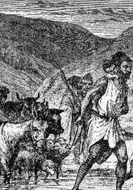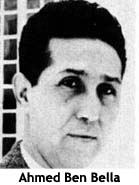 Emerging from this mix, the Berber people staked a claim to the land, and dominated until the coming of the Arabs and spread of Islam.
Emerging from this mix, the Berber people staked a claim to the land, and dominated until the coming of the Arabs and spread of Islam. Before the Arab invasion, Phoenician traders began arriving around 900 BC, creating the city of Carthage (in present-day Tunisia) and establishing trade links with the Berbers. As the Carthaginian's power over the region increased, the Berbers began recruiting into their army, and by the 4th century BC they formed the largest portion of the Carthaginian army.
Following the First Punic War, Berber soldiers rebelled after not being paid for their work, and succeeded in gaining control of a significant portion of Carthage's North African territory. The Carthaginian state subsequently began to decline, and by 146 BC had been completely destroyed.
The Arabs arrived in the mid-7th century, and vast changes occurred in the region's social and economic relations with the introduction of Islam and Arabic.
After enduring centuries of conquerors, military rulers and controlling empires, including the Ottoman Empire and Turks, Algeria fell under French rule in 1830.
Algeria's modern borders were created by the French, and during their domination a large part of the Algerian national identity was formed through the struggle to survive, co-exist, gain equality and achieve independence.
 Algeria finally broke free, and gained its long-sought after independence in 1962. Ahmed Ben Bella was elected the first president, and under his ruling the new government grew increasingly socialistic and authoritative.
Algeria finally broke free, and gained its long-sought after independence in 1962. Ahmed Ben Bella was elected the first president, and under his ruling the new government grew increasingly socialistic and authoritative. In 1965, Houari Boumedienne overthrew Ben Bella, and although he relied heavily on the army, the socialism trend continued.
A referendum in 1996 introduced new changes to the constitution, and a 1999 presidential election cast Abdelaziz Bouteflika into a five-year term.
Bouteflika's main concern was restoring the security and stability of the combat-ridden country, and his efforts were rewarded with a second five-year term in 2004.
Today Algeria is recovering and developing into an emerging economy, and natural gas and oil profits are being used to improve the infrastructure of the country.
The Romans and remains one of the most exotic destinations on the planet founded Algiers, the capital city, in the 10th century. Algeria is the largest country in Africa, and its main population centers are located along theMediterranean Sea coastline.
This huge landmass is dominated by the Atlas Mountains of the north and the vast barren reaches of the Sahara Desert, central and south. In fact the country is over 80% desert, including (3) gigantic sand seas.
No comments:
Post a Comment